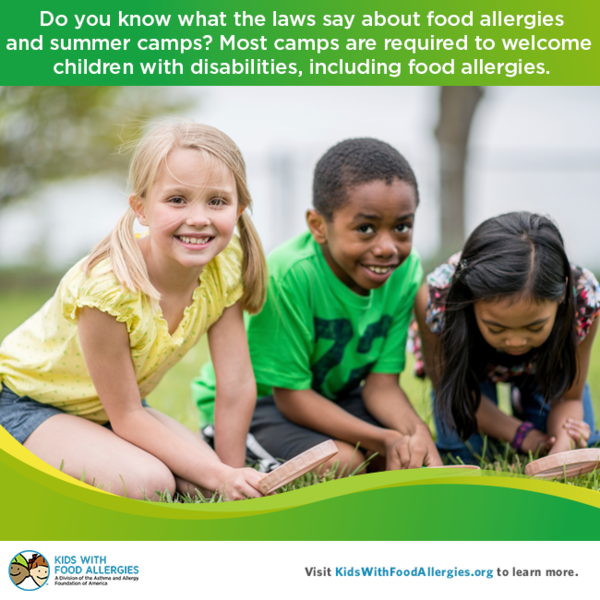Summer camp takes many forms: private day camps, sleep away camps, city recreation camps, or camps that focus on sports or art.
Many children enjoy and take part each year. For parents of children with food allergies, it is often another hurdle to jump through.

Did you know that the Americans with Disabilities Act (ADA) and Section 504 plans also apply to summer camps? Our friends at Allergy Law Project blogged about this recently.
Some camps act in different ways that are less-than-welcoming to children with food allergies.
Allergy Law said camps might:
• Tell parents they have to remain at camp
• Say they will not give epinephrine but will “guide” the child’s hand to self-administer epinephrine in case of a reaction
• Charge families extra
None of that is legal, said Allergy Law Project. Title II of the ADA covers public camps - meaning those paid for with tax dollars such as town summer camps. Title III of the ADA covers private camps. If the camps receive federal funds, Section 504 would also apply.
In a related 2014 case in New Jersey, the U.S. Attorney General settled a Title III ADA complaint against a private camp for not accommodating a child with diabetes. You can read the settlement agreement here.
"Advocacy requires that parents educate people in charge, whether camps or schools," said Mary Vargas, Esq., one of the lawyers of Allergy Law Project.
She said if a camp refuses to give epinephrine, refer the camp director materials from the Allergy Law Project about their obligations. "Be respectful and calm when doing so," she said.
"Many times, camps are willing to do what is necessary once they are educated," Vargas said.
"If all else fails, parents can seek legal counsel or file a complaint with the United States Department of Justice."
For more information about sending your child to camp, watch our webinar, Off to Camp with Food Allergies.
You can also view a webinar about 504 plans in schools with Laurel Francoeur, Esq., one of the three lawyers from Allergy Law Project, here.


Comments (1)